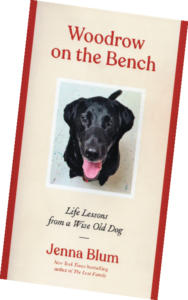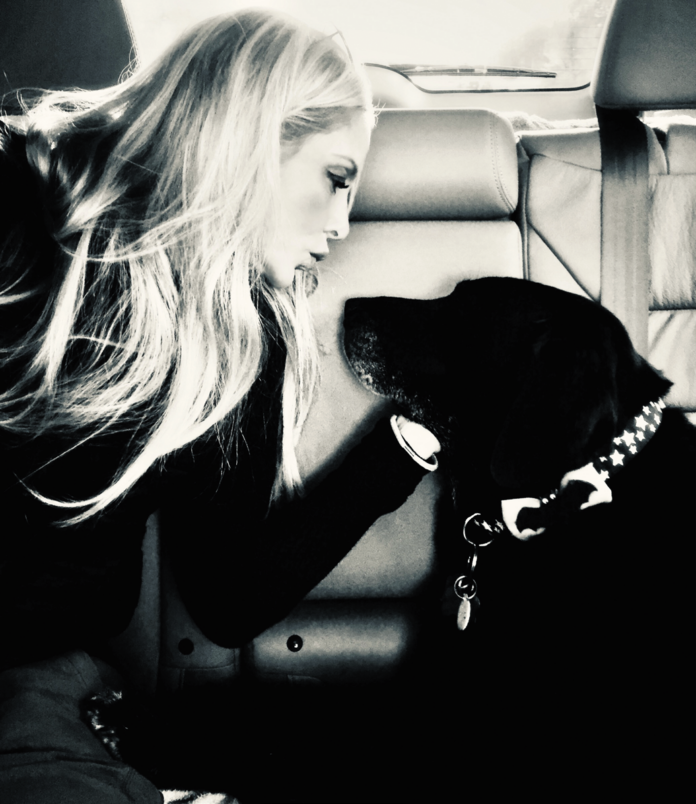It’s hard to imagine that a book chronicling the last months of a beloved dog’s life could be anything other than heartbreakingly sad. But Woodrow on the Bench: Life Lessons from a Wise Old Dog, transcends its subject matter. For sure, New York Times bestselling author Jenna Blum sheds plenty of light on her love and concern for 15-year-old black Lab Woodrow, the “George Clooney of dogs” with the grey stubble under his chin who enjoys napping in a wading pool “like a hippo.” But she also uses the last pages of the calendar of Woodrow’s life to generously share her own life’s ups and downs over the course of decades — a divorce, a broken-off engagement, the decision to birth books rather than children, her fear of being alone, her multitude of loving friends. The result is at times heartwarming, poignant, reflective, and downright funny.
Blum talks, for instance, of a dog acquaintance named Cashew, who she says “nosed me in places and ways that would have required a human to buy me a drink first.” She speaks about a group of teenage girls spotting Woodrow by the bench across the street from her apartment, flowing toward him “like an amoeba, exuding love and fruity shampoo.”
Sometimes the funny and the poignant come in the same wonderfully wrought turn of phrase, like the passage in which she describes her fear of dying alone while choking on the elaborate coq au vin she had prepared for herself, finally hacking it up, and then resuming the meal because it was “really good coq au vin.”
Through it all, an ever-widening circle of friends supports her as she feels Woodrow’s “spirit slipping away from me a bit more each day, like a little boat bobbing out toward the horizon. One morning I’d wake up, and it’d be gone.” They bring food for her, for Woodrow. They pet sit him. They celebrate his 15th birthday by bringing treats and dog toys. They take him to the ocean, which he loves so much, one last time. And they keep her company on the bench to which more and more of her time is consigned as Woodrow loses his ability to walk any further. Strangers befriend her on that bench, too, crying with her, telling her that they pray for her every day, helping lift Woodrow up when he can’t do it himself.
 Bringing the specter of time passing into even greater relief is that Woodrow begins his journey toward death at around the same time Blum’s mother’s journey ends. She succumbs too young to cancer just as Woodrow starts to become very sick, and Blum must come to grips with losing these two constants in her life in very short order. It makes her think about such things as what it would have been like to have “a couple of surly teenagers to remind me how terminally uncool I was”; to consider how, after she had seen a picture of her ex-husband on Facebook with a “predictably beautiful baby,” she felt “confused…and sad, and also a little relieved.”
Bringing the specter of time passing into even greater relief is that Woodrow begins his journey toward death at around the same time Blum’s mother’s journey ends. She succumbs too young to cancer just as Woodrow starts to become very sick, and Blum must come to grips with losing these two constants in her life in very short order. It makes her think about such things as what it would have been like to have “a couple of surly teenagers to remind me how terminally uncool I was”; to consider how, after she had seen a picture of her ex-husband on Facebook with a “predictably beautiful baby,” she felt “confused…and sad, and also a little relieved.”
Through it all runs the daily saga of getting 85-pound Woodrow up and down the stairs of her apartment building, dealing with the “poop-splosions” as he loses controls of his bowels, “forking over a couple of mortgage payments to keep alive a dog who was not destined to last much longer,” and listening for his breath every morning, watching his sides heave as she gets out of bed to make sure she has more time with him. She remembers how he used to change direction in a second as he bounded about with seemingly endless energy, while looking at him now is “like watching the Titanic make a turn.”
You’re most definitely going to cry as you read; make sure there’s a box of tissues handy. But you’ll also laugh out loud, smile quietly, reflect on the what if’s of your own life, and, most definitely, hug your dog close even as he asks you to throw his favorite saliva-covered toy for him.
Highly recommended.





